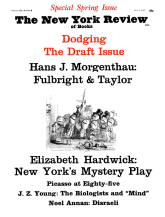In response to:
The Importance of Quine from the January 12, 1967 issue
To the Editors:
I would like to lift two sentences for critical comment from the concluding remarks of Mr. Quinton’s generally helpful article on Quine [NYR Jan. 12]. “The final upshot of Quine’s philosophy is an assertion of the essential unity of science and, even more, of the ultimate identity of science with all rational thought.” And then the clincher: “all thought aspires to the condition of science.”
I am not sure that these remarks are fair to Mr. Quine nor if it is fully proper to lift them from context, but when you make them stand forth in their boldness it does appear that some rather prominent features of a certain modern disposition (rationality?) shine forth in all their salient mythic proportions.
I do not believe that “all thought” nor even “all rational thought” aspires to the condition of science. Further-more, I do not believe that all thought “ought” to aspire to science. Would Mr. Quine and/or Quinton really have us trade in poetic nuance, Camus’ portrayal of the absurd, or the thoughts provoked by David Levine’s buttons for scientific thought—which ordinarily connotes the use of hypothesis, systematic description, and wherever possible statistical corroboration. Dostoevsky’s treatment of the human “heart” surely captures something missed by cardiograms, and in general science exhibits an all too “clumsy-precision” when dealing with human existence. Indeed, the point seems so obvious as to make the position presented in Mr. Quinton’s summary remarks appear absurd, but such may be the myopia of some modern “reasonable” men.
Nicholas J. Yonker
Dept. of Religion and Philosophy
Oregon State University
Anthony Quinton replies:
To some extent the difference between Professor Levi and myself is verbal: what he calls a logician I should call a philosopher and what he calls a philosopher I should call a sage. I dare say that what I call a logician he would call some sort of mathematician. But that is not all there is to it, for we both employ the label “philosopher” with an honorific tinge, we both think that what a real philosopher does is of special importance. He is for vision and I am for rational comprehension, too broad an abyss to be bridged in a correspondence column.
This Issue
April 6, 1967



